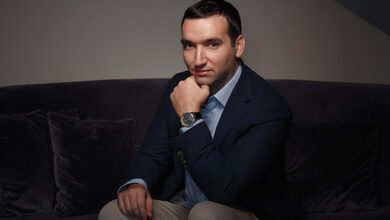Jean-Christophe Babin leads Bvlgari to new heights

Jean-Christophe Babin, a wanderer at heart, found a home at the illustrious Italian brand, Bvlgari, when he joined as the CEO in 2013. Having been at the helm of TAG Heuer prior to his new role, he was already familiar with the nuances of the watchmaking business and enthusiastically brought his extensive experience to Bulgari
In conversation with “Day and Night” magazine, Mr Babin explained the creative strategy of the brand and the manner in which he created a synergy across the multiple divisions of the company. He enlightened us about the inspiration behind some of the most iconic pieces of Bvlgari designs, such as the Serpenti and Lvcea. He also introduced the most recent and exciting launch by the brand- a digital luxury watch, which until now most connoisseurs thought was an impossible feat.
You come from a family of lawyers. How did you come to be in the luxury business?
Well probably because I didn’t want to be a lawyer! I was not really looking to get into the luxury business initially, as it was not something I wanted to do when I left university. I started work in consumer goods then moved to consulting and fifteen years ago, through a series of lucky coincidences I was offered a position at TAG Heuer, which ultimately led me to where I am now.
Since you joined Bvlgari in 2013 what changes have you made in terms of philosophy and the future plans of the brand?
The biggest change we have implemented is the re-focussing of the brand’s core values in the ladies jewellery and watch sector. Our efforts are centered around re-grouping the creative flow and simplifying the products on offer, particularly within four of our major styles, which include the Lvcea – a ladies-only line, launched last year; The Serpenti; The legendary Bvlgari-Bvlgari line – designed for both men and women that is currently celebrating forty years; and a line for men only – the Octo.

We also have high-end jewellery watches and high-complication watches, but the four styles mentioned earlier are our popular best-sellers. The launch of these lines has captured the interest of our clients, because the watches feature a strong hint of Italian culture that is vastly different from traditional Swiss watches. The models we offer cater for all tastes and age groups, we have logo watches, non-logo watches, daily wear, morning wear, evening wear, elegant and sporty variations. Bvlgari outperformed itself last year and we have achieved the same for the first quarter of this year. The strategies we employ are working very well in the global market and we hope this success continues its strong path of growth.
What kind of strategy changes has the brand seen in recent years?
Before I joined the company, the goal of Bvlgari was to increase global business and to ensure the brand remains a reputable and profitable company. Management wanted to raise brand awareness and to offer a range of products that would appeal to the modern client, and with my help we are still implementing this strategy to reach our goals. Recently we have re-focussed our efforts on exciting events to attract media attention and to enlarge our marketing and advertising scope to create an enthusiastic atmosphere for our products.
How is Bvlgari different from other watch-makers?
What makes Bvlgari different is that we offer more than just watches. We produce and sell leather goods, fragrances, jewellery and eye-wear, therefore we have a lot more knowledge in production compared to other brands who simply make watches. Our jobs are very exciting and stimulating as we have our fingers in many jars instead of just one, which keeps us extremely busy. Bvlgari also manages hotels so running a business in the hospitality industry has many aspects that need a lot of experience and skill.
Overall, it’s a lot more work but it’s also very interesting because in order to maintain the image of the brand we are forced to find the perfect balance of synergy between the divisions, as to ensure employees know what is expected of them. Our jewellery division is different from most collections in the market, as it is centred on the Roman code where inspiration comes from the magnificent Italian city itself. Its bold and powerful outlook makes it significantly different from Parisian jewellery.

How important is the Middle East region to Bvlgari?
The Middle East is a key region for us because we have a very strong network in place, with our brand being well-known in the market. Locals have a lot of affinity towards our brand style and designs of jewellery as we have discovered they prefer coloured stones, diamonds and high-end metal settings in their accessories. The Middle East is also home to a lot of expats whose tastes are beginning to steer towards diamonds, so therefore our products are a popular choice for them as well. Overall, the Middle East is a big market with increasing growth rates from Kuwait, Bahrain, the UAE and Saudi Arabia. We have an excellent growth dynamic in the Middle East and hope this success continues for many years to come.
You recently unveiled an NFC-enabled Diagono Magnesium watch. What has been the feedback like so far?
Judging by the reports in the media we have seen a very positive response. Everyone is talking about how a digital watch will never be a luxury watch because it’s just a mobile phone on your wrist, which becomes obsolete quickly. We have taken great care to ensure our Smartwatch does not fall into this category by adding unique features that are operated via a Swiss Manufacturing movement. The watch has an in-built microchip, but no battery as it takes its power from the external factors. It is like a virtual vault, which stores sensitive personal data such as passwords and financial details in an encrypted form. The icing on the cake is that the Smartwatch can be programmed to open the front door of the owner’s apartment or unlock the car door.







